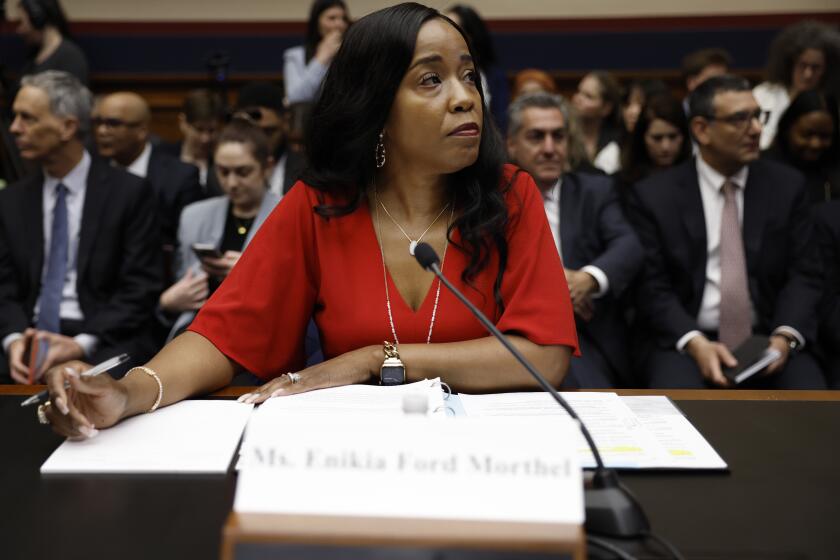Antisemitism, swastika grafitti created ‘hostile’ climate in Carmel school, probe finds

- Share via
Jewish students at a Carmel Unified School District campus were subjected to pervasive, antisemitic harassment over a three-year period, exposed to repeated swastika graffiti in bathrooms and on desks, a Hitler reference and a verbal threat targeting Jewish people, a federal civil rights investigation found.
The incidents “potentially exposed hundreds of students to antisemitic imagery,” resulting in a “hostile environment” — one that the district failed to eliminate, investigators with the Department of Education wrote in a 13-page letter to the district Friday outlining the violations and remedies.
Although the district did not admit it violated the law, school officials entered into an agreement with the department’s Office of Civil Rights to address campus adherence to Title VI — a federal law that prohibits discrimination based on race, color or national origin, including shared ancestry. The district will take 10 actions, including revising polices for reporting and responding to harassment complaints and training administrators to investigate and document complaints.
“I am fully committed to creating a safe environment for all of our students, as a school needs to be a place for growth and learning, not trauma,” Carmel Unified Supt. Sharon Ofek said in a statement. “As a Jewish-American, I fully support this major step towards ensuring that antisemitism is completely eradicated from the classroom, culture, and overall learning environment. To the victims whose unfortunate experiences led to the OCR investigation, know that you are not alone, and I am always here to support you.”
The Carmel Unified case is one of about 32 open investigations into discrimination based on national origin in California schools, according to the education department database.
The U.S. Department of Education recently opened civil rights investigations into UCLA, UC San Diego and three other California campuses, but it is unclear whether they are related to the Israel-Palestinian conflict.
The database shows the investigation opened in 2022, when a female student, who was not identified, alleged that the district discriminated against Jewish students by failing to “promptly and effectively” respond to reports of swastikas drawings at an unidentified school. The student also said that the district retaliated against her after she alleged discrimination, though investigators did not find sufficient evidence to substantiate this claim.
Investigators found nine instances involving swastikas and one instance of the N-word in 2021 and 2022. During the 2023-24 school year, six more incidents of harassment were reported. Due to high staff turnover, the district said, no records could be found for the 2022-23 school year.
Although district officials investigated several of the incidents and sought disciplinary measures, they failed to prevent them from happening again. They also did not recognize and try to eliminate the hostile environment the incidents created for Jewish students, according to the letter.
In repeated instances of swastika graffiti in the bathrooms, staff reviewed handwriting samples, campus security recordings and monitored the bathrooms before and after class, but were unable to find the person responsible.
Swastikas were also found on desks, rulers and on a student’s skin, the investigators found. One student was suspended.
Though administrators visited classrooms to discuss hate speech, graffiti and the consequences for such actions, they did not discuss swastikas or the meaning behind them, the federal report said. The school could also not prove that it offered counseling to those who witnessed or were victimized by the harassment.
“All we received was an unhelpful five-minute spiel in... class,” a student said during public comment at a 2022 Board of Education meeting. “The five-minute spiel just said that hate speech was happening and that the consequences would be suspension and possibly expulsion.”
By that point, the school had formed an Anti-Hate Speech Task Force made up of students, staff and administrators. They held at least 10 meetings, set goals toward improving school climate and sent out a race relations survey, which found that 40.49% of respondents were “upset” when they learned about the “racially motivated hate graffiti in bathrooms, on backpacks, and elsewhere.”
However, the Office of Civil Rights found no evidence that tangible steps were taken to meet those goals or change campus climate.
Supt. Enikia Ford Morthel rejected accusations that Berkeley schools have tolerated antisemitism, saying the district responds quickly to alleged incidents.
The incidents continued in the 2023-24 school year. The Office of Civil Rights received reports of more swastika graffiti and a Hitler reference, destruction of a movie poster and a verbal threat by a student targeting Jewish people that was not investigated, according to the letter.
As part of its agreement with the Department of Education, the district will address incidents of alleged harassment dating back to 2021, revise and disseminate its harassment policies and procedures, and develop a new way to track complaints. District officials have also agreed to educate students and parents on the types of discrimination that Title VI prohibits and how to report alleged violations, conduct a school climate survey with an eye toward antisemitism and come up with a plan to address the results.
On the administrative side, the district must train those responsible for investigating and resolving complaints on how to do so, and relay those responses to the Office of Civil Rights for the next two years.
More to Read
Sign up for Essential California
The most important California stories and recommendations in your inbox every morning.
You may occasionally receive promotional content from the Los Angeles Times.













